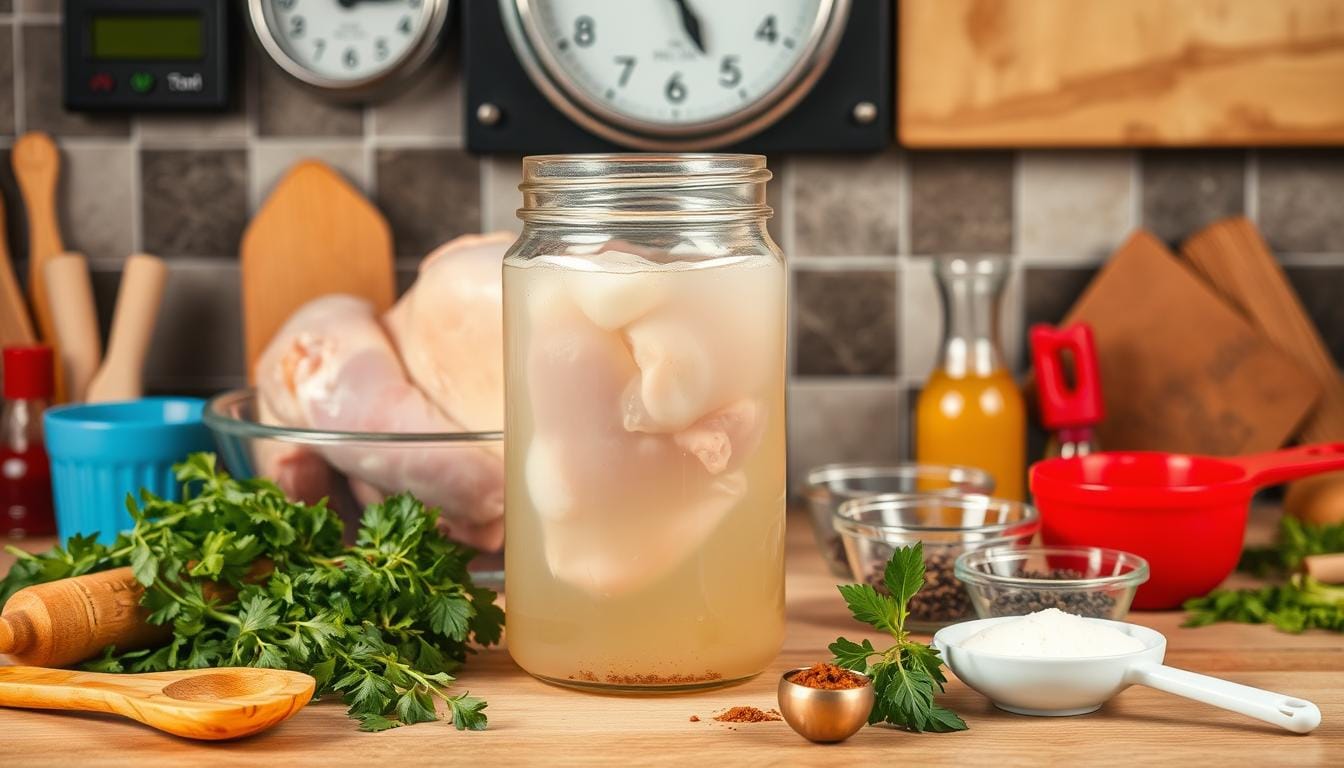How Long to Brine Chicken: Perfect Time Guide
I love cooking at home and always look for ways to make my dishes better. Brining chicken is a game-changer. It makes the chicken juicy and full of flavor. But, how long should you brine chicken for the best taste?
Today, I’m excited to share a guide on brining chicken. It will help you figure out the right brining time for different chicken cuts. Whether you’re cooking a whole bird, breasts, or bone-in pieces, this guide has you covered. It explains the science of brining and gives you the perfect times for delicious results.
Brining is a kitchen magic trick that can take your chicken dishes to the next level. With the right brining time, you can make your chicken taste amazing. So, let’s explore how to brine chicken perfectly every time.
Table of Contents
Understanding the Science Behind Chicken Brining
Brining chicken is more than a trend. It’s a science-backed method that makes your chicken juicy and flavorful. It works by using osmosis to change the meat’s texture and taste.
How Salt Water Affects Meat Texture
The secret to great chicken brining is how salt interacts with meat. Salt in the brine breaks down the meat’s proteins. This makes the meat softer and more tender when cooked.
The Role of Osmosis in Brining
Brining does more than just tenderize the meat. It also seasons the chicken from the inside out. The brine’s salt and moisture infuse into the meat, keeping it juicy during cooking.
Benefits of Brining Chicken
- Improved moisture retention: The brine keeps more juices in the chicken, preventing it from drying out.
- Enhanced flavor distribution: Salt and seasonings in the brine spread evenly, making every bite flavorful.
- Safeguard against overcooking: Brined chicken can handle longer cooking times without drying out.
Learning about chicken brining opens up a world of juicy, flavorful chicken. It can take your cooking to new levels. So, why not try it and see the difference for yourself?
Essential Ingredients for a Perfect Chicken Brine
Creating a delicious chicken brine starts with the right ingredients. The base is simple: water and salt. Use 4-6 tablespoons of kosher salt for every 4 cups of water. This mix is key for seasoning and keeping your chicken moist.
While a basic brine works well, you can elevate your chicken with extra ingredients. Some favorites include:
- Sugar – A bit of brown sugar or honey adds sweetness to balance the salt.
- Herbs and Spices – Fresh herbs like rosemary, thyme, or sage, and spices like peppercorns, add aromatic flavors.
- Garlic and Citrus – Minced garlic and a squeeze of lemon or orange add a zesty, savory taste.
- Soy Sauce – A tablespoon or two of soy sauce brings a delicious umami flavor.
The salt you choose can change the flavor and texture. Kosher salt is common, but you can try sea salt or pink Himalayan salt for different tastes.
“Brining is the secret to juicy, flavorful chicken every time. It’s an easy step that makes a world of difference in the final dish.”
For a perfect chicken brine, find the right mix of ingredients for your taste. Start with the basic recipe and then try different flavors to make your own special brined chicken.
How Long to Brine Chicken: Time Guidelines for Different Cuts
Brining chicken takes different times for each cut. Knowing the right brining time is crucial for great flavor and moisture.
Whole Chicken Brining Duration
Brine a whole chicken for 4 to 12 hours. This long time lets the brine soak into the meat. It makes the chicken juicy and full of flavor.
Chicken Breast Brining Time
Boneless, skinless chicken breasts need only 30 minutes to 2 hours in the brine. This short time keeps the meat moist and tender.
Bone-in Pieces Brining Period
Bone-in chicken, like thighs or drumsticks, brine for 1 to 4 hours. The bones help the brine soak into the meat. This makes the chicken more flavorful and juicy.
Remember, brining too long can make chicken too salty and soggy. Stick to the recommended times. For quicker brining, use more salt and brine for just 30 minutes for breasts.
| Chicken Cut | Brining Time |
|---|---|
| Whole Chicken | 4-12 hours |
| Chicken Breast | 30 minutes to 2 hours |
| Bone-in Pieces | 1-4 hours |
Knowing the best brining times for each chicken cut ensures your poultry is always moist, flavorful, and perfectly cooked.
Cold vs. Warm Brine: Which Works Better?
The temperature of the brine is key in chicken brining. Most experts say cold brine is best. Cold water brines make chicken tender and juicy, unlike warm brines.
Warm brines can make the chicken’s outer layers expand. This stops the brine from getting deep into the meat. Cold brines, however, let the brine spread evenly. This ensures the meat is well-seasoned and moist.
For safety, brine chicken in the fridge for longer than 30 minutes. Brining at room temperature can lead to bacterial growth. This makes your dish unsafe to eat.
| Brining Method | Tenderness | Flavor Penetration | Food Safety |
|---|---|---|---|
| Cold Brine | More Tender | Deeper Penetration | Safer (Refrigerate) |
| Warm Brine | Less Tender | Shallower Penetration | Less Safe (Room Temp.) |
In conclusion, cold brine is the best for chicken. It improves texture, flavor, and safety. This makes it a favorite among cooks and chefs.
Basic Chicken Brine Recipe and Measurements
Creating a delicious brined chicken starts with the right brine recipe. It’s all about finding the perfect salt-to-water ratio. Add optional aromatic ingredients to enhance the chicken’s natural flavors.
Salt-to-Water Ratio Guide
A standard chicken brine has 4 cups of cold water and 4-6 tablespoons of kosher salt. The salt amount can change based on the type of salt:
- 3 tablespoons of table salt
- 4.5 tablespoons of Morton’s kosher salt
- 6 tablespoons of Diamond Crystal kosher salt
Optional Seasoning Additions
To boost your chicken brine’s flavor, try these optional ingredients:
- Garlic, minced or smashed
- Whole peppercorns
- Fresh herbs (rosemary, thyme, sage)
- Bay leaves
- Citrus zest or juice
For longer brining, add 1 tablespoon of garlic granules for extra flavor.
“Brining is a simple but effective way to ensure your chicken stays moist and flavorful, no matter how you choose to cook it.”
Common Brining Mistakes to Avoid
Brining chicken can be tricky. Avoid these common mistakes to get juicy and flavorful chicken every time.
One big mistake is over-brining. If you leave your chicken in the brine too long, it can become too salty and spongy. Stick to brining for 1 hour per pound, or up to 24 hours for bigger pieces.
Using the wrong salt type or amount is another problem. A bad brine won’t tenderize or flavor the meat right. Use 4 tablespoons of salt per quart of water for the best results.
Don’t rinse the chicken after brining. This can spread bacteria in your kitchen. Just pat it dry with paper towels before cooking.
- Avoid over-brining, which leads to overly salty and spongy meat
- Use the right salt type and amount for an effective brine
- Don’t rinse the chicken after brining – just pat it dry
- Don’t add additional salt when cooking brined chicken to prevent oversalting
By avoiding these mistakes, you’ll get perfectly brined chicken every time. Happy cooking!

How to Tell When Your Chicken is Properly Brined
To get perfect brined chicken, you need to watch the process closely. Look for visual and textural signs that show your chicken is brined right. Knowing these signs helps you follow your chicken brining guide well and get the best results.
Visual Indicators
Brined chicken looks plumper than unbrined chicken. It’s fuller and more substantial, showing the brine has worked well. The skin also looks tighter and clearer, showing more moisture inside.
Texture Changes to Look For
Brined chicken feels firmer when you touch it. This firmness comes from the brine’s effect on the chicken’s proteins. It makes the meat more compact and tender. But, don’t overdo it, or the chicken might feel too soft and spongy.
When cooked, brined chicken stays moist and tender. The brine breaks down muscle fibers, making the meat juicy and flavorful. The right brining time ensures your chicken is delicious and moist.
Finding the right balance is key to perfect brined chicken. Brine too little, and you miss out. Brine too much, and it’s too salty. Watch for these signs to know when your chicken is brined just right.
Storage and Food Safety During Brining
When brining chicken, keeping it safe and fresh is key. Follow these important steps to keep your chicken good to eat:
- Refrigerate the chicken: If you brine for more than 30 minutes, keep it cold. Use safe containers like stainless steel pots or plastic buckets.
- Fully submerge the chicken: Make sure the chicken is fully covered in brine. This spreads flavors and moisture evenly.
- Store after brining: After brining, store the chicken in the fridge for up to 3 days. Or, freeze it for 2 months if you won’t cook it soon.
By following these chicken brining instructions and chicken brining tips, you keep your chicken safe and tasty. Remember, how you store and handle it affects your meal’s quality and safety.

“Brining is a simple but effective way to ensure your chicken stays moist and flavorful, but it’s crucial to follow food safety guidelines throughout the process.”
Post-Brining Preparation Tips
After brining your chicken, it’s time to get it ready for cooking. To get crispy, flavorful skin, dry the chicken well before cooking. Start by gently patting the chicken pieces dry with paper towels. Don’t rinse the chicken, as it can spread bacteria in your kitchen.
For extra-crispy skin, let the brined chicken air-dry in the fridge for several hours or overnight. This drying process helps remove moisture from the skin. This makes the skin crispier when cooked. Also, remember to adjust your recipe by reducing or eliminating extra salt, as the chicken is already seasoned from the brine.
| Chicken Brining Tips | Benefit |
|---|---|
| Pat chicken dry with paper towels | Removes excess moisture for crispier skin |
| Air-dry in the fridge for 2-24 hours | Further dries the skin for optimal crispiness |
| Reduce additional salt in recipe | Avoids over-seasoning due to brine |
By following these simple tips, you’ll make juicy, flavorful chicken with a crispy exterior. Enjoy the fruits of your brining labor!
Cooking Methods for Brined Chicken
Brining your chicken is just the first step. Now, it’s time to explore different cooking methods. These methods will enhance the flavor and tenderness of your meat. You can choose from roasting, grilling, or other techniques.
Roasting Guidelines
To roast a succulent brined chicken, preheat your oven to 425°F (218°C). Dry the chicken with paper towels and lightly oil the skin. Roast it until the internal temperature hits 165°F (74°C), which takes about 1 hour for a 4-5 pound bird.
Don’t add extra salt to the seasoning. The brine has already seasoned the meat perfectly.
Grilling Techniques
Brined chicken also excels on the grill. The high heat caramelizes the outside while keeping the inside juicy. Preheat your grill to medium-high heat.
Cook the chicken for 6-8 minutes per side, depending on the thickness. Remember, don’t oversalt the chicken. The brine has already seasoned it well.

